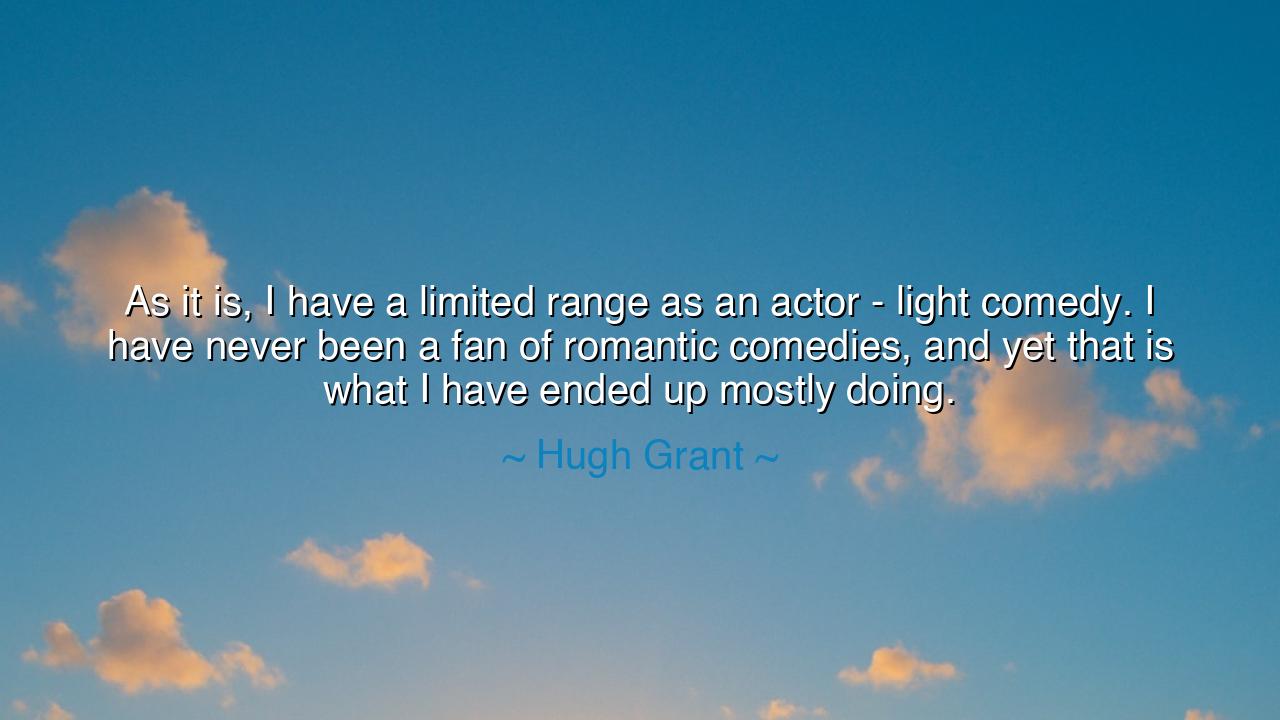
As it is, I have a limited range as an actor - light comedy. I
As it is, I have a limited range as an actor - light comedy. I have never been a fan of romantic comedies, and yet that is what I have ended up mostly doing.






Hear the voice of Hugh Grant, who with disarming honesty once confessed: “As it is, I have a limited range as an actor—light comedy. I have never been a fan of romantic comedies, and yet that is what I have ended up mostly doing.” These words, though spoken lightly, carry the burden of a truth known to many who walk the path of creation: that fate does not always grant us the roles we desire, but often the ones the world demands. In his confession lies a lesson about talent, destiny, and the struggle between the work we love and the work we are called to do.
The origin of Grant’s lament is rooted in the great success of films like Four Weddings and a Funeral and Notting Hill, which made him a symbol of the charming, awkward, quick-witted Englishman. The world embraced him as the prince of romantic comedies, the master of light comedy, and for this he was praised, adored, even idolized. Yet behind the applause was a man who never sought to be confined to such roles. His heart, perhaps, yearned for tragedy, for drama, for the darker shades of the human condition. And so he found himself caught in a paradox: the world celebrated what he did not love, and what he loved was hidden from the world.
This tension is as old as art itself. Consider the tale of Sophocles, the Greek tragedian. He wrote more than a hundred plays, yet only a handful survive, and among them, his name is forever linked to Oedipus Rex. Though he may have desired his full body of work to be remembered, history confined him to one role: the poet of fate and blindness. Or think of Charles Dickens, who longed to be remembered as a serious novelist, but who was forever celebrated for the sentimental warmth of his characters and the humor of his tales. In each case, as with Grant, the hand of fate chose which mask the world would remember.
Grant’s words also touch a deeper truth: that the public often sees only what it wants, not what the artist intends. The crowd craves familiarity, and once it finds a figure who satisfies its hunger, it resists change. Thus the actor, the writer, the painter, may become bound to a single style, a single genre, a single face. The irony is cruel: the artist, who longs for freedom, becomes chained by success itself. For Grant, success meant laughter, romance, and charm—yet success also meant limitation, and limitation is a heavy burden to one who dreams of more.
But this burden need not be despair. It teaches us that life often places us in roles we do not choose, and yet from these roles, we can still create meaning. Even if Grant found himself confined to romantic comedies, he transformed them with wit, depth, and humanity, elevating what might have been shallow into something beloved. Here lies the hidden wisdom: even in the role you did not choose, you may still bring greatness, if you pour your truth into it. The world may hand you a narrow stage, but within that stage, you can still shine with a brilliance that endures.
The lesson, then, is this: do not scorn the work that comes your way, even if it is not the work you imagined. The path may not match your desire, but if you walk it with courage and authenticity, it can still become a path of glory. At the same time, do not abandon your deeper longings; nurture them, so that when the chance arises, you may reveal to the world the fullness of your soul. Accept the mask the world gives you, but never forget the face beneath.
Therefore, children of tomorrow, when you find yourselves doing what you did not choose, remember Hugh Grant’s words. Embrace the task, give it your heart, and make it worthy of remembrance. But also remember that you are more than any single role. Keep alive your hunger for truth, for newness, for growth. For the artist, like the soul, is never one thing, but many. And though the world may see only part of you, let it never be said that you failed to bring light even through the narrowest of windows.
Thus, what began as Hugh Grant’s gentle confession becomes a teaching for all ages: that success and limitation are twins, that fate gives us roles we do not always choose, and that true greatness lies in playing them with such honesty that even the smallest part becomes eternal.






AAdministratorAdministrator
Welcome, honored guests. Please leave a comment, we will respond soon